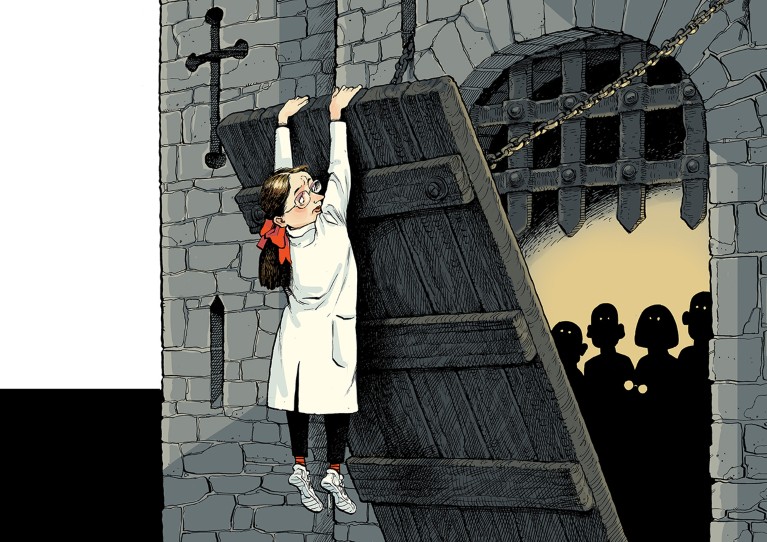
Illustration: David Parkins
The problem
Dear Nature,
I’m a developmental biologist who secured a tenure-track position at a university in the southern United States. I spent eight years building my laboratory, training graduate students, applying for grants and publishing papers. At the end of the eight years, when I went up for tenure, I felt confident. My research was in a good place, two of my students had graduated and gone on to excellent positions and I had several notable publications. My department recommended me for tenure, and my colleagues told me that I had nothing to worry about. Then, despite my strong record, I was denied tenure at the university level.
When my department chair told me the decision, I was shocked. I had never considered what I would do if this happened. My chair and other department members are convinced that I should appeal, because personal relationships might have influenced the decision — but I’m not sure what to do. I feel like I did the best I could, and it wasn’t good enough. Do I accept the decision and walk away? Do I fight it? Do I ever get to know why I was denied tenure? — Sincerely, a bereft biologist
The advice
Nature reached out for advice to three professors who have experienced tenure denial. In the United States, the tenure process typically involves a five- to eight-year period in which a tenure-track assistant professor builds their lab and compiles a portfolio of their research and mentoring accomplishments. This portfolio is reviewed by faculty members in the department and division, as well as individuals outside the institution, who then decide whether to recommend the person for promotion and tenure at the university level. When someone is highly recommended by their department and division, it can be jarring to be denied tenure at the university level. “It’s a very difficult situation,” says Anindita Bhadra, a behavioural biologist at the Indian Institute of Science Education and Research Kolkata. “The first thing I would ask myself is, ‘Why?’”
Bhadra suggests that you review your CV and evaluate whether your university had certain expectations that you didn’t meet. If your CV has a gap in mentorship or scholarship, for instance, then she recommends reaching out to a senior colleague or peer who has been in a similar situation and asking them for feedback on how to address it.
But this approach often doesn’t work in cases involving discrimination or biased assessments, she adds. “Biases are not written down anywhere.” In such a situation, Bhadra encourages you to consider whether you want to appeal against the decision, reapply for tenure at the same university or look for a position elsewhere.
“I think everyone’s situation is really different,” says Terry McGlynn, an ecologist at California State University, Dominguez Hills, in Carson. “The first question you have to ask is, if you fought the decision, won and you got to keep your job, would you still want to be there?” If the answer is yes, then McGlynn suggests you evaluate the likelihood of winning your appeal. “Usually that depends upon whether or not there was a procedural violation. Did the university break its own rules?” he asks.
Nature spoke to one ecologist who hired a lawyer to help him appeal a tenure denial at a US university after he uncovered procedural violations caused by one of his committee members, as well as evidence of biases that this person held against him. The ecologist recommends following your university’s process for contesting a tenure denial; in his case, he consulted with the ombudsperson and requested an inquiry from his university’s Office for Institutional Equity and Diversity. After these approaches failed, he sought legal support.
The ecologist hired an employment lawyer with experience in his state, and together they wrote an appeal letter. “Since every state has its own variations in the employment law, you need somebody who’s experienced at the state level,” he says. “The lawyer was very helpful in identifying where the procedural problems were and crafting the appeal in a way that would be effective.”
The appeal letter urged his university to launch a full investigation into his case, which resulted in him getting a contract extension and the opportunity to reapply for tenure in two years. “The lawyer was not cheap, but I think it was worth it,” he says. But he also acknowledges that this route doesn’t always lead to the desired outcome. “The university agreeing, giving a contract extension and another chance for tenure doesn’t happen that often.”
The ecologist was eventually awarded tenure last year, during what he says was a much smoother review process.
Over the years, McGlynn has been vocal about his tenure-denial experience and has spoken to others in similar situations. “Based on my interactions with scores of faculty who have been denied tenure, I have developed the opinion that tenure denials have nothing to do with academic performance — they have to do with toxic environments, personality conflicts or some political motivation. The reason that universities choose to write down is not always why it happened,” he says. One major criticism of the tenure system is that it inherently involves subjectivity, which can lead to denials for unfair reasons that have nothing to do with academic track record.
“Not having support is the biggest problem that I think people come across,” says Bhadra. “Having friends and colleagues who stand by you goes a long way for your mental health and for moving forward” after a denial, she says, even if you can never fully understand the reasoning. Talking to a therapist can also help you to work through some of the trauma from the experience, McGlynn adds.
If you decide that you don’t want to appeal, Bhadra and McGlynn recommend seeking out other positions. For example, career coaches can help you to craft a cover letter and provide advice throughout the application process on how to be transparent about your tenure denial. “It’s really, really hard to apply for jobs when you’re going through all the stress and trauma. That’s why it’s important to make sure you plan ahead and identify friends and allies who can help steer you in a new direction,” says McGlynn.
All three researchers noted that the experience of being denied tenure is stressful and difficult — and at times can feel Earth-shattering. “It’s not only some level of rejection by the institution that you’ve probably given too much of yourself to for the last six to eight years, but it’s also, for many people, the end of a career path that you’ve been building to your entire adult life,” says McGlynn.
But it is possible to get to a better place, they say. After being denied tenure, Bhadra decided to stay at her university — and, after three years, she reapplied for tenure and was awarded it in 2015. McGlynn decided to leave his university and apply for other academic positions. “I ended up at a place that is more aligned with my values and has a healthier work environment. I’m so much better off,” he says.









